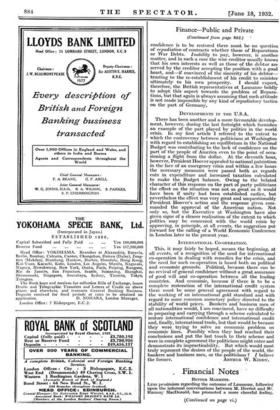IN the two preceding articles I affirmed a strong belief
that the main causes responsible for world depression are political in character. I suggest that during the past fortnight some of the developments which have been taking place strongly support that belief. Nothing has occasioned more anxiety with regard to the prospects of a favourable outcome of the Lausanne Conference than the manifestations of unsettled political conditions in some of the chief countries taking part in the Conference. In the case of Germany, for example, the resignation, or the dismissal, of Herr Briining and the fact that the President has made political appointments of a character which, according to the cables from Berlin, suggest that a fresh General Election must take place shortly, have materially damped the hopes concerning the outcome of the Conference. When the representatives of Great Britain go to Lausanne they know that any decisions to which they agree will be supported by the people here, but whether the representatives of Germany will feel that they have ,a similar mandate, 'or whether 'the decisions reached will ultimately be made the subject of party politics in a General Election, it is most difficult to say. And, again, with regard to France, though conditions, of course, are orderly and established compared with those prevailing in Germany, these is considerable doubt whether the two great political parties in France are sufficiently united to make it possible for the representa- tives who go to Lausanne to take the strong lead which is necessary if the Conference is to decide, once and for all, the problem of Reparation Payments.
GERMANY'S RESPONSIBILITIES.
Admittedly, however, it is within the power of Germany to reduce to a minimum the political elements in the problems to be discussed at Lausanne. In essence, the_ Conference should be one concerned with finance. It is common ground that Germany is unable to pay the huge amounts which ordinarily she would be called upon to provide after the expiration of the Hoover moratorium. It is, or at all events it should be, common ground also that a settlement of the Reparations problem, once and for all, would give a -tremendous stimulus to financial confidence. The creditor countries, therefore, by taking a big view and showing real magnanimity with regard to Reparations, would quickly gain in credit and confidence and ultimately in actual business prosperity something far greater than anything represented by Reparation Payments. But—and the " but " is a most important one—the whole Conference might be wrecked at the outset if Germany were to adopt the line of actual repudiation of Reparation obligations. The War is still too near for the causes of the conflict to be forgotten, at all events, by the older members of the present generation. Quite apart, however, from questions concerned with the origin of the War, the sanctity of the contract on which the present total of Reparations is based has to be recognized. It is one thing for Germany, as it is for an individual, to declare and to demonstrate the impossibility of meeting an obligation, and quite another to repudiate its validity. Especially is this true when, as is now the case, the world is suffering from a great shock to credit. If (Continued on page 884.) Finance—Public and Private (Continued from page 882.) - confidence is to be restored there must be no question of repudiation of contracts whether those of Reparations or War Debts. Inability to pay, however, is another matter, and in such a case the wise creditor usually knows that his own interests as well as those of the debtor are served by the creditor accepting the position with a good heart, and—if convinced of the sincerity of his debtor— trusting to the re-establishment of his credit to minister ultimately to his own prosperity. I should expect, therefore, the British representatives at Lausanne boldly to adopt this aspect towards the problem of Repara- tions, but that again is always assuming that such attitude is not made impossible by any kind of repudiatory tactics on the part of Germany.
DEVELOPMENTS IN THE U.S.A.
There has been another and a more favourable develop- ment, however, during the last fortnight which furnishes an example of the part played by politics in the world crisis. In my first article I referred to the extent to which the controversy between politicians at Washington with regard to establishing an equilibrium in the National Budget was contributing to the lack of confidence on the part of the people of America even to the point of occa- sioning a flight from the dollar. At the eleventh hour, however, President Hoover appealed to national patriotism in the face of an emergency crisis and within a few hours the necessary measures were passed both as regards cuts in expenditure and increased taxation calculated to make the Budget balance. Owing to the belated character of this response on the part of party politicians the effect on the situation was not as great as it would have been if unity had been established earlier, but nevertheless the effect was very great and unquestionably President Hoover's action and the response given com- manded the approval of the American nation. Not only so, but the Executive at Washington have also given signs of a clearer realization of the extent to which politics may be concerned with the world crisis by approving, in principle, at all events, the suggestion put forward for the calling of a World Economic Conference in London later in the present year.
INTERNATIONAL CO-OPERATION.
This, it may fairly be hoped, means the beginning, at all events, of a recognition of the need for international co-operation in dealing with remedies for the crisis, and the need for such co-operation is based both on political and economic grounds. Political, because there can be no revival of general confidence without a great assurance of good will and co-operation between all the leading countries. And economic, because if there is to be a complete restoration of the international credit system there must be some general agreement with regard to the working of an international gold standard and with regard to some common monetary policy directed to the stability of world prices. Bankers and business men of all nationalities would, I am convinced, have no difficulty in preparing and carrying through a scheme calculated to restore international confidence and international credit and, finally, international trade, but that would be because they were trying to solve an economic problem on economic lines. Possibly when they had reached their conclusions and put the last touch to their scheme and were in complete agreement the politicians might enter and demonstrate its impracticability. But which would most truly represent the desires of the people of the world, the bankers and business men, or the politicians ? I believe









































 Previous page
Previous page